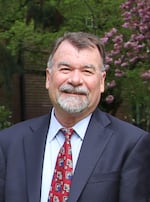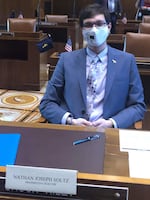Oregon’s oldest public university, Western Oregon, in the small Willamette Valley city of Monmouth, will be cutting multiple programs and the equivalent of more than a dozen full-time faculty, hoping to get ahead of falling enrollment that’s only been worsened during the pandemic.
Administrators say it’s a necessary move to protect the financial health of the university, and a way to keep the 165-year-old institution affordable for prospective students. But employees, current students and alumni say they’re worried about a change in campus culture and community — especially with eliminations of programs like philosophy, which teach broadly beneficial skills, such as critical thinking, analysis and writing.
“To cut philosophy is to cut out the soul of the university,” WOU philosophy department chair Mark Perlman said. “And I’m really sad that certain people just don’t understand that. All they do is they live by spreadsheets, and, that’s not how you’re supposed to run things.”
Perlman has been teaching at Western Oregon University for 23 years, and is among the four tenured professors being laid off.

Mark Perlman has taught at Western for 23 years.
Mark Perlman
The equivalent of 11 non-tenured faculty are also affected, either through layoff, or a significant reduction in the classes they’re teaching.
Laid off faculty, like Perlman, will be employed at the university for another year, as required by the faculty union’s collective bargaining agreement.
The cutbacks have been deeply divisive on campus, both because they mean the elimination of valued programs, but also because they resulted from a process directed in part by a president on his way out.
Late last year, a task force including WOU President Rex Fuller, released a plan laying out various cuts for the school. That final plan included eliminating programs like philosophy, anthropology and geography, master’s programs in information systems and in music, as well as other certificates and minors.
That task force deemed the cuts necessary due to low or declining enrollment in those particular programs.
“Quite candidly, given that we are a publicly funded university where enrollment matters, at this point, about 70% of our revenues come from enrollment activities related to tuition and fees,” President Fuller told OPB.

WOU President Rex Fuller is set to retire later this year.
WOU
Fuller is set to retire later this year, and some faculty and staff members say the decision-making for program cuts has been too rushed, and many express an overall sense of disappointment in where Western is heading.
Both faculty and staff unions at WOU last year initiated a “no confidence” vote in which more than 85% of voting members expressed a lack of confidence in Fuller’s leadership.
“I want to be clear that this vote was never anything that [the union] or the staff really wanted,” said Jackson Stalley, a library technician and WOU staff union’s president. “It was something that, as those voices became so loud from our staff colleagues that we couldn’t ignore anymore.”
Before these most recent faculty layoffs, WOU announced last year that more than 50 staff members were either to be laid off or not have their contracts renewed.
As for the current program eliminations, the faculty union said that it is not persuaded that such drastic cuts are needed, and if they are needed, then there needs to be a more transparent process.
“We know the budget is under some pressure at WOU. We are in the process of analyzing just how much of a budget issue there is,” Scott Beaver, communications director for WOU’s faculty union, said. “But either way we believe that if we were given time to investigate how to reasonably address any relevant budget issues, we would be confident that we’d be coming to an appropriate and justified conclusion. Many faculty do not feel that way right now.”
Fuller said the next fiscal year is when the university would begin to see savings from the program cuts — due to the year-long lag before layoffs take effect.
The planned cuts are estimated to save about $1.5 million from faculty salaries. Total savings reach above $2 million total when including benefits and other personnel expenses, according to WOU Provost and Vice President for Academic Affairs Rob Winningham.
While administrators point to the challenging budgets and decreasing enrollment over the past decade, students and faculty members, like Perlman, feel like they’re bearing the consequences of problems they didn’t create.
“It really feels like a betrayal at a very deep level,” Perlman said. “My job as a professor is to teach the students that are in my class. The administration’s job is to get them to the university and put them in my class. I’ve been doing my part this whole time. The administration has been falling down on the task of keeping enrollment where it should be.”
Students say philosophy is not just for majors or minors
Of the programs being cut, philosophy is getting the most extreme treatment. Western is eliminating both the philosophy major and minor and laying off half of its faculty — two out of four professors. Those cuts come as a devastating blow to students currently enrolled at Western who suddenly have to re-think their future plans.
WOU philosophy major Zach Zappe attended college in his home state of Colorado and in Florida, before transferring to WOU. He’s set to graduate next year, but he said if he can’t get a philosophy degree, he’ll have to transfer somewhere else.
“I’m pretty torn up about it because I transferred to Western, and I might have to transfer again, which is just, you know, transferring is just kind of a painful process, and it costs money,” Zappe said.

Current WOU philosophy major, Zach Zappe.
Zach Zappe
WOU officials say all students currently pursuing a philosophy degree, as well as any other degree program slated to be cut, will be able to finish through a “teach-out program.”
According to the university, faculty will develop a schedule for affected students so they can complete their required courses within the next few years. WOU could also offer “meta majors” such as a humanities major or interdisciplinary major.
Zappe is considering going to grad school and eventually teaching, but he said that’s not something he can do with the degree alternatives at WOU.
“If you’re trying to go into academia for philosophy, you need a philosophy major,” Zappe said.
He said he knows other students in his program that will end up leaving WOU if only offered an interdisciplinary degree.
According to Fuller and other administrators, the main reason for cutting the philosophy program and others is due to a low number of students pursuing a major or minor.
“The three majors — philosophy, anthropology and geography, account for less than 1% of our students,” WOU Provost Winningham said.
Even though students may not be declared philosophy minors or majors, Zappe said he’s always had classes with students from a variety of different programs.
“I can see that the philosophy program has been positively affecting other students outside of the program. And so I think that it has value in that, and Western is absolutely going to be losing out on that,” Zappe said.
Nathan Soltz — a recent WOU graduate with degrees in philosophy and psychology, and a minor in political science — said his philosophy classes were also often filled with students outside of the program.
Soltz is now chief of staff for Oregon Sen. Lew Frederick, D-Portland.

WOU graduate Nathan Soltz sits after casting one of Oregon's electoral votes in December 2020. Soltz is Oregon Sen. Lew Frederick's Chief of Staff.
Nathan Soltz
“The Western administration is cutting a program that, at its very core, teaches critical thinking skills and teaches how to have serious discussions and teaches how to see the world in a less polarized point of view,” Soltz said, noting the national context, of deep political divisions and suspicions. “It’s really doing a disservice to the whole community at any time trying to cut this really valuable program, but [especially] trying to cut it now when it’s more important than ever.”
Winningham and President Fuller say there will still be philosophy courses taught at WOU, even without students able to declare a major or minor, and fewer faculty.
Not a ‘fatal blow’ for Western
Western, like the majority of Oregon public universities, has been hit especially hard financially during the pandemic. Oregon’s seven public universities saw an average enrollment decrease of 3.8% last fall in comparison to fall 2019, according to data from the Oregon Higher Education Coordinating Commission, or HECC, though not every institution saw decreases
“The combination of increased expenses and reduced revenues have been, you know, really, really tough [on] budgets, really across all of Oregon’s public universities,” Ben Cannon, the HECC’s executive director, said.
But, Western has seen a trend of declining enrollment for years. From 2011 to 2020, the university’s enrollment has decreased more than 25%, according to WOU.
Oregon has seen declining enrollment and financial difficulty lead major private universities to close in recent years, including Concordia University in Portland and Marylhurst University, one of Oregon’s oldest private colleges.
But Cannon said Western Oregon’s enrollment trend is not terribly different from some other public institutions, and he said he’s not worried for Oregon’s oldest public university.
“I think we have every reason to be optimistic about Western’s future,” Cannon said. “I don’t think that the types of reductions that have been proposed represent anything like a fatal blow for Western.”
Cannon said part of the solution to situations like Western’s is working together with other public universities and community colleges to form partnerships that serve and support students with the programs they need — especially students from marginalized communities.
Oregon lawmakers are currently considering a bill that would allow voluntary mergers between public universities and community colleges, though no institutions have openly expressed their intention to take part in any such deal.
Cannon said Western has already done a great job of engaging students from local communities, and focusing on increasing diversity.
He noted that WOU is likely soon to be designated as a Hispanic Serving Institution, defined as an institution with at least 25% Hispanic full-time undergraduate students. As of last fall, WOU was at about 20%.
Another solution, Cannon said, would be more of a financial commitment to higher education from the state.
“It’s the legislature, the people’s representatives to provide the base funding for our community colleges, for public universities that can sustain them through good times and especially through challenging years, like this one,” Cannon said.
Worries over what WOU could become
For faculty, staff and students at WOU, many are worried about how the campus culture and community will be affected by the program and position cuts.
Philosophy chair Perlman, Stalley with the staff union and Beaver with the faculty union all say there needs to be more communication and more opportunities for input and shared governance.
“If people don’t feel invested in decision making, they lose morale. They lose their dedication to the place,” Perlman said. “If it just becomes a place where I show up when I teach and I go home and ‘what do I care?,’ then it’s not gonna be the special place that it’s been for all these years, and that’s the direction we’re heading.”
Recent grad Soltz was part of WOU’s student government when he was at the university. He said although he appreciated his time at Western, the cuts and administrative actions are not surprising to him.
“This administration has for a very long time, despite what their words may say, have through their actions, shown that they don’t value the kind of education that Western Oregon University is providing and should be providing,” Soltz said. “They want to make this school something that it isn’t, which is not just a detriment to the Western Oregon University community, but to Oregon’s public university system as a whole.”
Philosophy chair Perlman agreed that Western appears to be redefining itself by cutting these programs.

Bellamy Hall at Western Oregon University in Monmouth.
Diane Stevenson Photography
“I think it becomes a place where you go not to become educated, but it’s like job training school,” Perlman said, noting that it was philosophers who initially created the idea of the university in ancient Greece. “The idea of the university is you don’t just get the training you need for a job or a career — you become an educated person. You come to know things in all different areas.”
He also noted students, like Soltz, often don’t go on to become philosophers or scholars but instead take the skills like critical thinking and problem solving and apply them to their everyday lives.
“We have not focused on pumping out a lot of majors and even pumping out a lot of minors,” Perlman said. “We’ve focused on providing something for all the students of the university.”
The diminishing faculty isn’t new this year. Like the declining enrollment, Western has seen its faculty steadily shrink over the last decade. As of November 2020, the most recently available data provided, WOU had 329 faculty members, including tenured and tenure-track professors, as well as full and part-time non-tenured faculty. That’s down from 421 faculty members in 2012.
Provost Winningham acknowledged the effects of cutting programs and employees at WOU, but he and President Fuller say these cuts now will help WOU’s financial stability, and affordability for students, in the future.
“Frankly, I’d say our campus is still grieving, not just the loss of the faculty positions, but also dozens of staff positions, and we’ve had to do that,” Winningham said. “Otherwise we would have needed to significantly increase tuition. ... But more pragmatically, that would have cut off access to higher ed for many Oregonians. And so that’s one of the reasons we’re having to do this very difficult work.”



